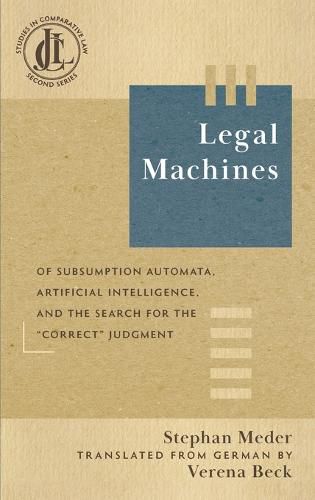Readings Newsletter
Become a Readings Member to make your shopping experience even easier.
Sign in or sign up for free!
You’re not far away from qualifying for FREE standard shipping within Australia
You’ve qualified for FREE standard shipping within Australia
The cart is loading…






This title is printed to order. This book may have been self-published. If so, we cannot guarantee the quality of the content. In the main most books will have gone through the editing process however some may not. We therefore suggest that you be aware of this before ordering this book. If in doubt check either the author or publisher’s details as we are unable to accept any returns unless they are faulty. Please contact us if you have any questions.
As advances in artificial intelligence grip our imagination in the twenty-first century, Meder reminds us that law's first "machine age" dates from at least the seventeenth century and the inventive minds of Jean Bodin and Thomas Hobbes. Jurists involved in finding legal decisions would be merely a cog in a large apparatus designed to give expression to the will of the sovereign through the proper application of the law. The nineteenth century declared war on the absolute monarchical state and the mechanistic paradigm. The critique of a "mechanical" application of law and the distorted image of the "subsumption automaton" have stood for criticism of judging that, removed from the demands of "everyday life," adheres to predefined concepts and dispenses with reflection on law and justice. Rudolf Jhering's "judgment machine," Hermann Kantorowicz's "thinking machine," or Max Weber's "paragraph automaton" can be seen as pejorative images of a machine into which "one throws the files at the top, together with costs and fees, so that it spits out the judgment at the bottom, along with the more or less valid reasons." Digitization is transforming the means of delivery and providing greater sophistication, but Meder's study is a thorough and pioneering reminder that people today are seeking new routes to a long-cherished and not necessarily desirable outcome. x, 167 pp.
$9.00 standard shipping within Australia
FREE standard shipping within Australia for orders over $100.00
Express & International shipping calculated at checkout
This title is printed to order. This book may have been self-published. If so, we cannot guarantee the quality of the content. In the main most books will have gone through the editing process however some may not. We therefore suggest that you be aware of this before ordering this book. If in doubt check either the author or publisher’s details as we are unable to accept any returns unless they are faulty. Please contact us if you have any questions.
As advances in artificial intelligence grip our imagination in the twenty-first century, Meder reminds us that law's first "machine age" dates from at least the seventeenth century and the inventive minds of Jean Bodin and Thomas Hobbes. Jurists involved in finding legal decisions would be merely a cog in a large apparatus designed to give expression to the will of the sovereign through the proper application of the law. The nineteenth century declared war on the absolute monarchical state and the mechanistic paradigm. The critique of a "mechanical" application of law and the distorted image of the "subsumption automaton" have stood for criticism of judging that, removed from the demands of "everyday life," adheres to predefined concepts and dispenses with reflection on law and justice. Rudolf Jhering's "judgment machine," Hermann Kantorowicz's "thinking machine," or Max Weber's "paragraph automaton" can be seen as pejorative images of a machine into which "one throws the files at the top, together with costs and fees, so that it spits out the judgment at the bottom, along with the more or less valid reasons." Digitization is transforming the means of delivery and providing greater sophistication, but Meder's study is a thorough and pioneering reminder that people today are seeking new routes to a long-cherished and not necessarily desirable outcome. x, 167 pp.